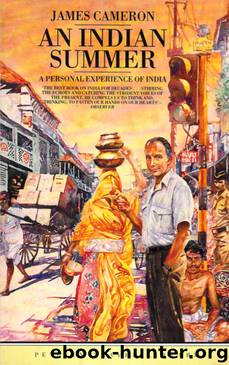An Indian Summer by James Cameron

Author:James Cameron [Cameron, James]
Format: epub
Tags: Biography, Travel, Historical, India
Published: 0101-01-01T00:00:00+00:00
7
At the Bangalore Club the other day we celebrated the twenty-fifth glorious year of India’s Independence and rebirth with a whist drive. It seemed as good a way as any other. In the event, nobody turned up. Far away in Parliament the Prime Minister read some political bromides over the radio. It was all over in half an hour.
‘We made a tryst with destiny…’ I remember that thin tenor voice through the hot Delhi night, each syllable drifting over an enormous human ocean. ‘At the midnight hour, while the world sleeps, India will awake to life and freedom.’ Thus Jawaharlal Nehru announcing Independence in 1947. I was young in India then and deeply moved.
Now, I suppose, I know the smatterings that pass for understanding and that are the most the stranger shall ever know. If I was allowed to share the Indian nostalgia for the brave days of 1947, I could share the flat disappointment of the empty whist drive and the flagging hopes of today.
India survived as the world’s greatest democracy, in so far as the word had any meaning at all. The Government pursued a constitutional policy of equality and social justice, which at the present rate would take about forty million years to achieve. Mrs Gandhi was now the bestselling line in prime ministers ever known, as one was daily obliged to recognise: the cult now transcended anything her revered father ever knew. She was Saviour, Winged Victory and Earth Mother. The cover of the Illustrated Weekly of India had a pious triptych portrait of her ‘inspired by the Hindu concept of the Trimurti, or Trinity of God’. This might have been a bit of a facer for those who understood that what she ruled was at least a secular state.
We lived on slogans. In Delhi the millennium was born once a week with a new chapatti-in-the-sky. A third nuclear station was going up at Kalapaka in Madras, and the official Planning Commission agreed that nearly 300 million people still lived below the barest subsistence minimum - that is, on less-than fifty pence a week. The Defence budget made enormous claims on revenue, and education was actually moving backwards: 70 per cent of Indians were still illiterate, more than in the British days because, of course, there were more of them. The college system was in such a calamitous mess that there were even illiterate graduates. After twenty years of central planning the Health Minister admitted that there was no possible means of fixing a date when 600,000 villages would get fresh drinking-water. You could go on quoting these figures unto anaesthesia, which is what almost everyone did.
Of course Mrs Gandhi, as a good socialist and a true patriot, was ‘taking steps to abolish poverty’ - and proper steps too, on paper: nationalising the banks, abolishing the Princely purses, ceilings on land-owning and so on.
They were all reasonable pieces of symbolism; their impact would take centuries so long as the well-to-do could buy themselves out of most dilemmas and the poor could not.
Download
This site does not store any files on its server. We only index and link to content provided by other sites. Please contact the content providers to delete copyright contents if any and email us, we'll remove relevant links or contents immediately.
Asking the Right Questions: A Guide to Critical Thinking by M. Neil Browne & Stuart M. Keeley(5760)
Autoboyography by Christina Lauren(5228)
Eat That Frog! by Brian Tracy(4526)
Dialogue by Robert McKee(4389)
Sticky Fingers by Joe Hagan(4188)
Journeys Out of the Body by Robert Monroe(3615)
Annapurna by Maurice Herzog(3464)
Full Circle by Michael Palin(3443)
Schaum's Quick Guide to Writing Great Short Stories by Margaret Lucke(3375)
Elements of Style 2017 by Richard De A'Morelli(3343)
The Art of Dramatic Writing: Its Basis in the Creative Interpretation of Human Motives by Egri Lajos(3061)
Atlas Obscura by Joshua Foer(2955)
Why I Write by George Orwell(2945)
The Fight by Norman Mailer(2930)
The Diviners by Libba Bray(2927)
In Patagonia by Bruce Chatwin(2922)
The Mental Game of Writing: How to Overcome Obstacles, Stay Creative and Productive, and Free Your Mind for Success by James Scott Bell(2897)
Venice by Jan Morris(2568)
The Elements of Style by William Strunk and E. B. White(2470)
